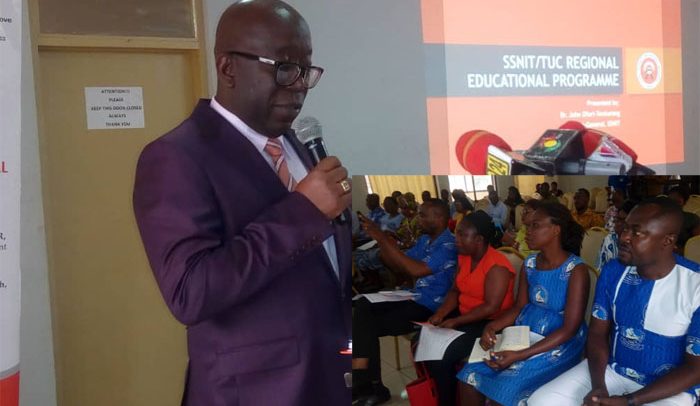Dr. Ofori-Tenkorang speaking. INSET: A cross section of Organized Labor
THE SOCIAL Security and National Insurance Trust (SSNIT) has announced its intention to use Mobile Money and other innovative payment systems for the payment of pension benefits and contributions.
According to the Trust, the move is to reduce the hassle associated with benefit and contribution payments.
Director General of SSNIT, Dr. John Ofori-Tenkorang, made this known on Wednesday, June 12, 2019, in Tema as he engaged Organized Labour.
The forum was to provide the platform for stakeholders to discuss issues related to pensions and benefit computations.
Dr. Ofori-Tenkorang indicated that SSNIT was committed to paying all legitimate claims promptly.
He indicated also that SSNIT has put in place measures to operate transparently and be more engaging.
In 2018, he disclosed that a total of Gh¢ 2.5 billion was paid to pensioners as benefits.
Also, he disclosed that the Trust cleaned about 6,000 ghost names from its payroll, resulting in a Gh¢ 43 million savings.
According to him, the current management of SSNIT was committed to transparent operation.
The Deputy Greater Accra Regional Secretary General of the Trades Union Congress (TUC), Joshua Ansah, commended SSNIT for the engagement, calling on young employees to take their pension contributions seriously.
He warned them against conniving with their employers to make low contributions to SSNIT.
According to him, young employees should not see pension contribution as something for only older workers.
That, he said, was because, after retirement from active service, pension benefit is what they could depend on for survival.
SSNIT’s educational forum has already been held in Bolgatanga, Tamale, WA and Sunyani.
It is aimed at promoting knowledge of the SSNIT Scheme, empowering organised labour as peer educators for the Trust as well as demystifying some of the issues surrounding benefits computation and partnering the Trust in compliance enforcement.
The regional meetings are also in compliance with the directive by the National Pensions Regulatory Authority (NPRA) to the Trust to intensify its public education activities and to ensure that members of the Scheme understand how their benefits are calculated.
BY Melvin Tarlue


